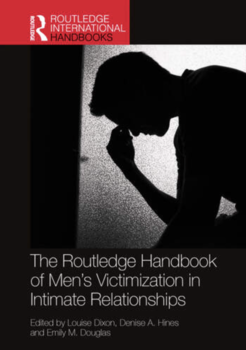More than two decades ago, George Mason University researcher Denise Hines began investigating a topic most researchers wouldn’t touch: men as victims of intimate partner violence (IPV). She and collaborator Emily Douglas were the first in the United States to earn federal funding for this line of research, publishing studies that challenged entrenched gender assumptions and provoked debate in the field.

Their new book, The Routledge Handbook of Men’s Victimization in Intimate Relationships, offers the most thorough international synthesis of this topic to date. Drawing on research from 31 contributors across five continents, it surveys how men experience abuse across places as varied as Uganda’s rural villages, the cities of China, and crisis shelters in Denmark.
“What makes this book different is its global perspective,” says Hines, the Elisabeth Shirley Enochs Endowed Professor of Social Work at George Mason. “Most of the existing literature has been based in the U.S., U.K., and Canada. We wanted to broaden the lens.”
Hines co-edited the volume with Douglas, professor of social work and child advocacy at Montclair State University, and Louise Dixon, pro vice-chancellor of education at Glasgow Caledonian University in Scotland.
Geared toward both academics and frontline professionals—including therapists, social workers, law enforcement, and legal advocates—the book highlights where current systems fall short and prescribes changes needed in prevention, policy, and services for male IPV victims.

Hines authored two central chapters, reviewing international studies on heterosexual men abused by female partners. She first focuses on English-speaking countries, where the research is more established. Her second chapter surveys a more fragmented but growing body of work from non-English-speaking regions across Europe, Asia, Africa, Latin America, and the Caribbean.
“I think this work gave me a better global sense of what colleagues are working on,” Hines says. “It also showed where the gaps are—for example, there’s far less research coming out of Latin America than Africa.”
As the book’s preface notes, the field of family violence has historically excluded male victims from the narrative. Early researchers who challenged that framework—such as Murray Straus, Suzanne Steinmetz, and Richard Gelles—faced intense backlash, including bomb threats, campaigns to have their tenure revoked, and defamation. Hines recalls similar reactions to her early work, including an online accusation that she was a male abuser using his academic standing to further abuse women and provide excuses to male abusers.
Despite that resistance, the field has evolved. Hines’ new handbook urges a more inclusive, evidence-based approach, accounting for men’s experiences across cultures, ages, sexual orientations, and social contexts.
“Partner violence doesn’t fit one mold,” Hines says. “Our laws and our systems need to change to become more inclusive of the range of victims of partner violence.”
